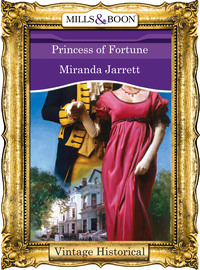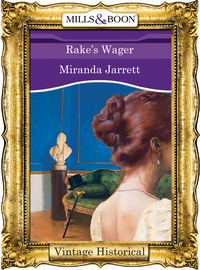
Полная версия
The Adventurous Bride

“How do you know I won’t simply take the painting from you?” he asked softly.
“Because I trust you, my lord,” she said without hesitation. “You understood the merit of the picture the instant you saw it—not just its value, but its power. Which means that by trusting you I am either very brave, my lord, or very foolish.”
He chuckled as he let his hands drop away from the painting. “Tell me which you are.”
“I am sorry, my lord,” she said, “but you must decide for yourself.”
He cupped her jaw with his palm, turning her face up to his. “Then I should say you’re brave, Mary.” His mouth was just over her lips. “Very, very brave.”
How many favors would she grant him? How adventurous did she really mean to be, here beneath the willows?
Author Note
I’m delighted to be launching a new trilogy of books with The Adventurous Bride. Join Lady Mary Farren and her sister Lady Diana, daughters of the Duke of Aston, as they begin a rollicking journey with their governess Miss Wood across England, France and Italy, a trip filled with excitement, danger, laughter and, of course, with love.
In eighteenth-century England, aristocratic young gentlemen were expected to sow their wild oats on the Continent, and the wealthier and more blue-blooded the gentlemen, the wilder and more far-flung the oats. But what of the well-bred young ladies like Mary and Diana with a similar desire for adventure and experience before their proper, arranged marriages? What intrigues await them on the other side of the English Channel, traveling gloriously far from homes, consciences and anxious mothers and fathers?
For the beautiful daughters of the Duke of Aston, the adventure is about to begin….
The Adventurous Bride
Miranda Jarrett

www.millsandboon.co.uk
MILLS & BOON
Before you start reading, why not sign up?
Thank you for downloading this Mills & Boon book. If you want to hear about exclusive discounts, special offers and competitions, sign up to our email newsletter today!
SIGN ME UP!
Or simply visit
signup.millsandboon.co.uk
Mills & Boon emails are completely free to receive and you can unsubscribe at any time via the link in any email we send you.
Contents
Chapter One
Chapter Two
Chapter Three
Chapter Four
Chapter Five
Chapter Six
Chapter Seven
Chapter Eight
Chapter Nine
Chapter Ten
Chapter Eleven
Chapter Twelve
Chapter Thirteen
Chapter Fourteen
Afterword
Chapter One
Aston Hall, Kent
June, 1784
W ith a little twitch of her gauzy muslin skirts, Lady Mary Farren took her place among the dancers in her father’s ballroom. The evening was warm, the tall windows thrown up to catch any possible breeze from the gardens outside. Beneath the dozens of flickering candles in the chandeliers, the flushed gentlemen around her were trying their best to be handsome and gallant, the ladies striving to be beautiful and flirtatious, and all of them were confident they represented the very cream of their little county society.
This had been the only life Mary had known in her eighteen years—the only life she’d been permitted to know as the eldest daughter of the Duke of Aston. But in three days, that would finally, blissfully change forever, and Mary—ah, Mary couldn’t wait.
Even as the musicians finished the last notes of the dance and her partner bowed across from her, Mary was eagerly ticking off the last details for the journey in her head: the bespoke traveling clothes packed in the new brass-studded trunks, the passages booked and the letters of introduction held safely in readiness, the maps and guides and—
“Lady Mary, if you please.” Miss Wood, Mary’s longtime governess and soon-to-be companion on her journey, stood beside her, her small, plump hands clasped across the front of her plain gray gown. “A word alone, my lady, if you please?”
At once Mary nodded, leading the way to one of the window alcoves where their conversation would be lost in the music and chatter around them. Though at twenty-eight Miss Wood was still a young woman herself, the governess was always the very soul of discretion and propriety, and only a genuine emergency would bring her into the ballroom, where she was as out of place as a mourning dove among gaudy parrots. But since the duchess’s long illness and death four years before, Mary had capably assumed many of her mother’s duties for her father, and it was quite appropriate for the governess to seek her out now.
But oh, please, let this be nothing that would delay her departure! God forgive her this once for being selfish, and wanting nothing to stop her first chance at a life beyond Aston Hall!
“What is it, Miss Wood?” Mary asked now, keeping her voice low. Possible disasters raced through her head: an accident among the staff, a mishap to a guest, grievous news from afar. Anything could be possible. “What has happened?”
“It’s your sister, my lady,” Miss Wood said. “Your father His Grace has asked for her to join him, and I cannot find her anywhere.”
“Diana’s gone?” Mary’s anxiety took a sharp new twist. It wasn’t that she feared some dire mishap had befallen her younger sister. Diana was always the cause of mischief, never the victim, beautiful and blithe and as irresistible to men as they were to her.
It simply didn’t seem to be in Diana’s blood to be otherwise. Where Mary was responsible and considerate, Diana was neither. How many times had Mary been left to soothe their father’s wrath after Diana had been traipsing gaily about the countryside with yet another smitten young gentleman, always skipping just on the edge of real scandal and ruin without a thought for how it would affect her chances for a respectable marriage? How many promises had Diana made to reform, only to beg Mary to make things right again with Father when the next gallant appeared beneath her window?
“You have looked everywhere, Miss Wood?” Mary asked, praying that for once the governess might be mistaken. “I’m sure I saw Diana dancing not a half hour ago.”
Miss Wood’s round face lit with hope. “Do you recall her partner? Perhaps she’s with him, my lady, and we—”
“She was dancing with Dr. Canning, as a favor to Father.” Mary sighed. Dr. Canning was at least seventy, with thick spectacles and scattered wits, and little ability left for wooing any female. “He’s a most kindly old gentleman, but I’d scarcely think Diana would vanish to the garden folly with him.”
“I’ve already looked in the folly, my lady.” Miss Wood glanced over her shoulder, to where Mary’s father stood with several friends. Despite the gaiety swirling around him, he was not happy, that was clear enough. He had summoned Diana, and as both a duke and a father, he expected instant obedience. But Diana hadn’t appeared, and now Father was glaring across the room at them with his arms folded—no, battened—over his silk-covered chest.
“I’ve checked her bedchamber, my lady,” continued Miss Wood more hurriedly, “as well as the schoolroom, the library, the withdrawing room, even the creamery.”
“Do not even mention the creamery!” Mary sighed again, this time with exasperation. Whatever had occurred in the creamery last summer between Diana and a certain young tutor down from Oxford still made Diana giggle into her napkin whenever the butter was passed at table. Mary didn’t want to know, truly she didn’t. “Perhaps Diana’s only gone to the privy.”
Miss Wood shook her head. “The waiting-maid there hadn’t seen her all evening, my lady, and—”
“The stables.” To her dismay, Mary suddenly recalled Diana smiling down at the brawny new groom as he’d helped her mount her mare this morning. When he’d returned Diana’s smile more warmly than was proper, Mary had thought it only because he was new to the staff, and hadn’t yet realized his place. Now she thought otherwise.
And oh, what Father would say if he ever learned of it!
“The stables, my lady?” Miss Wood asked. “Do you believe that—”
“It’s only a guess,” Mary said quickly. “I’ll hunt for Diana, while you tell Father that—”
“I am sorry, my lady, but I cannot permit that,” Miss Wood answered firmly. “Not to the stables, not alone at night.”
“But if I can find Diana before—”
“Your place is here at the ball, my lady,” Miss Wood insisted. “You remain here with His Grace’s guests, and I’ll go look for Lady Diana.”
“She’s my sister,” Mary said, looking over the governess’s head to her irate father, “and I’ll go find her myself.”
Miss Wood frowned. “But His Grace—”
“Tell Father Diana will be there directly. He won’t even realize I’m gone.” Mary turned away to slip through the nearest door to the garden before Miss Wood could protest again.
She ran down the slate steps and along the path of crushed stones, bunching her skirts at her sides so she wouldn’t trip. Here away from the heat of the candles, the evening was cooler, and Mary breathed deeply, steeling herself for whatever might lie ahead. There was no telling where or how or even if Mary was going to find Diana.
To be honest, she hoped she didn’t. Just as she and Miss Wood were set to leave for the Continent, Diana and Father would be setting out this week for London, where Diana would be introduced at court and, with her beauty and a little luck, attract a suitable husband of a suitable rank and fortune. It was exactly what Diana claimed to want most from life, and why she would risk it now for the sake of a flirtation with a groom was beyond Mary’s comprehension.
Purposefully she kept to the shadows, taking care not to be noticed. The yard before the stables was filled with the guests’ carriages tonight, and the waiting drivers and footmen sat on the carriage-steps or on the lawn, talking and laughing and making bawdy-talk with the housemaids who’d somehow slipped free of the party inside. There was no sign of Diana, nor of the new groom, either, though likely by now they’d retreated to some more intimate place.
Confound her sister for putting her in this position again! Doubtless Diana had convinced herself that she wasn’t breaking any promises to behave at all, that dallying with a servant somehow didn’t count. Mary hated having to play watchdog again, almost as much as she’d hate having to face Father one more time.
It wasn’t that she didn’t love Diana, because she did, with all the love and devotion that two motherless sisters could have for one another. That would never change. But standing in Diana’s beautiful, irresponsible shadow, always ready to catch her if she tumbled or protect her if she erred, had become an exhausting place to be. Wistfully, and guiltily, too, Mary longed to be known not as His Grace’s daughter or Lady Diana’s sister, but simply as herself. On the Continent, far from Aston Hall, she prayed she would.
Now she hurried around the curving brick wall and through the stable house’s side door. Except for the snuffling and whinnying of the sleepy horses in their stalls, the stable seemed empty and dark.
“Diana?” she called. “Diana, are you here?”
No answer came, not that Mary really expected Diana to come popping out from the loft like they had when they’d been little girls playing in the hay. This was different—far, far different.
She cleared her throat and raised her voice. “Diana, Father’s asking for you. If you’re—if you’re hiding in here, you must come back to the house and the dancing at once. Do you hear me?”
No answer again, but this time Mary was certain she heard a rustling that wasn’t a horse, a muffled giggle from one of the farther box stalls. For Mary, that was more than enough. She seized one of the lanterns that hung by the door and marched back to the stall, holding the light high before her.
“I am serious, Diana,” she announced crossly, the flickering light bouncing and bobbing over the planked walls. “Come now, or I’ll flush you out like Father’s hounds do with a fox, see if I don’t.”
At the last box, she shoved the gate open and raised the lantern over her head like a beacon.
And gasped.
It was hard for Mary to tell which were her sister’s body and arms and legs and which the groom’s, they were that wrapped around one another. Diana’s yellow gown was hiked high over her legs with shameless abandon, the man’s tanned hand spread possessively over her pale thigh above her bright pink ribbon garter. She’d pulled his shirt free of his breeches, her own hands twisting along his broad bare back. Her blond hair was half-unpinned and loose, her cheeks flushed, every inch a wanton rather than a peer’s daughter.
“Mary!” Diana squeaked, clinging more closely to the groom and slipping around him as if to hide. “Whatever are you doing here, spying on Will and me?”
“I’m not spying, Diana,” Mary said, her own face hot with embarrassment. “Father wants to see you at once, and you know you must go. Can’t you see that I’m trying to save you from yourself?”
“Ah, now, my lady, where’s th’ sport in that?” The groom twisted about to leer at her, keeping one arm curled around Diana’s waist while he beckoned to Mary with the other. “Better t’spend than t’save, I say. Come along, sweetheart, there’s plenty o’ me t’ share with both of you sisters.”
Before Mary realized it, he’d reached out and taken her hand to pull her closer. Too shocked to speak, she struggled to jerk free, the lantern swinging wildly in her other hand.
“Stop, Will, don’t!” Diana cried. “Mary, hush, it’s not—oh, dear God in heaven, Father! Oh, no, Father!”
Her heart pounding with dread, Mary slowly turned. It wasn’t a tease; it wasn’t a jest. There by the gate stood Father, as furious and grim as she’d ever seen him, with Miss Wood and Robinson, the stable master, hovering behind him.
She gave a tiny, desperate dip of a curtsey, the best she could manage under the circumstances. If only Miss Wood had let her handle this herself, instead of bringing her father into it!
“Father, please,” Diana began breathlessly. “This isn’t what it must seem.”
“No, Father,” Mary agreed with desparate haste. “It’s not, not at all.”
The groom pulled free of Diana and touched his knuckle to his forehead. “Beg pardon, Your Grace, but her ladyship’s speaking true. This don’t be what it seems, not by—”
“Hold your tongue, you wretched fool!” Father’s expression darkened, black thunderclouds by the lantern’s light. “No excuses from any of you. I know what I see, and I know what this is.”
“Don’t fault Mary, Father, I beg you.” Diana shoved down her skirts and tried to smooth her hair. “She was only—”
“I’ll tell you the same as I told your sister, Diana,” Father said sharply. “No more excuses from either of you.”
“We’re not making excuses, Father,” Mary pleaded. “I was only—that is, we were—”
“No more.” His hand sliced through the air, a sharp gesture to match the cutting edge of his voice. “Make yourselves decent, and come to me in the library. Now.”
He turned on his heel and left them, his back ramrod-straight with his anger, and Miss Wood scurrying after him into the dark. The stable master grabbed the groom by the shoulder and half-shoved, half-dragged him from the stall.
Mary looked at her sister. Diana bowed her head. It was too late for explanations now, too late for remorse or contrition.
All they could do was obey.
An hour later, Mary sat on the edge of the bench in the hall outside the library, her feet flat on the floor and her hands clasped in her lap. Diana had gone in first to Father, and though Mary could not make out their words through the closed door, she could hear enough to know that Father’s anger hadn’t cooled a bit, and that Diana’s wailing tears and shrill protests had done nothing to help her cause.
Mary bent her head, closing her eyes and pressing her hands over her ears to try to shut out her quarrelling family. Soon enough she’d be called in to stand between them. She’d have to soothe Father’s temper, and coax fresh promises of reformation from Diana. One more time, she’d make some manner of a shaky peace, the oil poured on the constantly roiling waters of Aston Hall.
From behind the closed door came the crash of hurled porcelain, and Mary hunched her shoulders like a turtle retreating into its shell. In three days, she’d sail for France, and be free of it all.
Only three more days….
The door flew open. “He is cruel, Mary, unspeakably cruel to me and to you—to us both!” Diana sank down on the floor before the bench, her wrinkled yellow skirts spreading out around her, and clutched Mary’s hands in her own. “Oh, Mary, I am so vastly sorry!”
“Don’t fuss over me, Di,” Mary whispered urgently, knowing they’d little time before it was her turn. “What made him most cross? Quick, quick, tell me! What must I say to coax him back to good cheer?”
But Diana only shook her head, her face still flushed with weeping. “Oh, Mary, how can you forgive me? I only meant to amuse myself for a moment or two, and now look what has happened! For Father to make us both suffer so, when—”
“Mary, come,” called Father sharply from inside the library. “I know you’re waiting out there, for you always were the obedient one.”
“Don’t worry, Diana, I’ll set things to rights.” Mary smiled, and gave Diana’s hands one final squeeze to reassure her. Then she smoothed her skirts, raised her head high, and joined Father in the library.
“Here you are at last, Mary.” He was sitting in his leather-covered armchair, pushed back from his desk. Though a widower, Father was still in his prime, his belly flat beneath his Chinese-silk waistcoat and besotted ladies tittering about him wherever he went. Unlike most gentlemen of his generation, he’d chosen to follow the newer fashion, and had abandoned wigs in favor of his own dark hair cropped short and feathered with gray.
Yet as Mary came to stand before him, what she noticed first was how the large vein in his forehead pulsed, a bad sign that she recognized all too well. His temper seemed to simmer around him like a swarm of hornets, anger and disappointment and general irritation vibrating together in the warm night air.
“Your sister has shamed me again, Mary,” he began, his voice an irate growl. “Not even you can defend her this time.”
“I would not defend Diana, no,” Mary countered with care, searching for the best way to soothe him. “Thus I ask not for forgiveness for her, but for mercy.”
“Oh, mercy you.” He snorted with disgust. “Come along, Mary, I’d expect more wit from you than that.”
“Mercy doesn’t require wit, Father.”
“No, but I do.” With his guests now departed, he’d shed his coat and rolled back the ruffled cuffs of his shirt to his elbows, his thick fingers drumming irritably on the carved mahogany arm of his chair. “Why do you defend Diana, anyway? She was acting like a common slattern with that rascal, as if her good name and mine weren’t worth a brass farthing.”
“She didn’t mean to upset you, Father, I’m sure of it,” Mary said. “I’ll grant she was irresponsible—”
“Oh, aye, letting some base-born groom ruck up her skirts,” he growled, and struck his open palm on the arm of the chair with frustration. “I’ve no right to be upset about that?”
“Yes, Father,” Mary said, knowing from experience that this was always the safest reply, and often the only acceptable one. “Of course you have.”
“Then why does your sister keep shaming me like this?” Unable to sit still any longer, he shoved back his chair and rose, turning his back to Mary to stare out the window. “It’s high time she weds. I’m too old for her willfulness. She needs a strong, young husband to thrash her into obedience, some young lion who’ll break her spirit and fill her belly. That’s what she needs—an honest husband and a brood of children. What better way to make a wild filly into a mare?”
“Yes, Father,” Mary said again. “If Diana can only find a gentleman she can love with all her heart—”
“Don’t speak to me of drivel like that, Mary,” Father snapped. “Love! The last thing your sister needs is a dose of that foolishness.”
“No, Father,” Mary said softly. She remembered her parents as being devoted to one another, as much in love as any sweethearts. Since her mother’s death, Father spoke of love with only bitterness and scorn, and no tenderness for Mama’s memory, as if her last, wasting illness were some personal affront to him. “But if she is able to make a favorable match in London, one that pleases you, then—”
“No London.” His hands were clasped so tightly behind his back that they looked more like clenched fists. “How can I possibly introduce Diana to Her Majesty after such scandalous behavior?”
“But none of the guests learned of it,” Mary protested. “The only one who might talk would be that wretched groom, and I’m sure Mr. Robinson will speak to him so he won’t—”
“That ‘wretched groom’ will have the next three years of his life to repent,” Father said curtly. “I’ve ordered Robinson to give him over to the press gang, so that he might serve His Majesty’s navy instead of my daughter.”
“The press gang!” she exclaimed, appalled by so severe a punishment. “Oh, Father, you would not send Diana away, too!”
“If it were my choice, I’d lock her away in the darkest convent I could find,” he said grimly. “But you’ve asked me to be merciful, Mary, and so I shall.”
“Then you will forgive her?” Mary asked with fresh hope. “You’ll take her to London, and to court?”
“I said I’d be merciful, not a fool.” At last he swung around to face her. “I’m sending her abroad with you.”
Chapter Two
Calais, France
W ith the small brass bell jangling overhead, Lord John Fitzgerald stepped into the musty shop that housed Dumont’s Antiquities, and paused to let his eyes grow accustomed to the gray twilight. John had been here many times before; he knew what to expect, even the murkiness and mildew, and none of it fooled him. Though Dumont himself was French to his bent old bones, the signboard that hung outside the shop was painted in English, a beckoning convenience for Dumont’s mostly British customers.
It was a credit to the Frenchman’s shrewdness that he acknowledged the importance of those British visitors to his trade, just as he recognized how they’d reverently interpret every speck of ancient dust as proof of authenticity. Since the last peace had been signed between Britain and France and travel to the Continent had once again become fashionable, scores of English gentlemen and ladies trooped through Dumont’s shop with their eyes wide and their purses open, ready to lap up whatever tales he told about his dubious wares, and to pay whatever he asked for the privilege.
John, however, knew otherwise. He’d a gift for discerning the false from the true, and he wasn’t afraid to say so, either. In a shop that prospered from deceptions, his eye and his knowledge made him the least-welcome of Dumont’s customers: an English gentleman too knowledgeable to be properly fleeced.
“Ah, bonjour, my lord.” Dumont groaned sourly, and rolled his eyes toward the dusty heavens. “So you’ve returned to plague me again, eh?”
“And a good day to you, too, Dumont,” John said, his gaze swiftly scanning the cluttered shop for anything new of value. Because Calais was so often either the first or the last stop on his journeys, he was a frequent visitor. “I’ve returned because I’ve heard you’ve new stock from Florence.”





